Lithuania in the Eurovision Song Contest
Lithuania has participated in the Eurovision Song Contest 23 times since its debut in 1994, where Ovidijus Vyšniauskas finished last, receiving "nul points". Lithuania withdrew from the contest, not returning until 1999. LT United's sixth place in 2006 with the song "We Are the Winners" is Lithuania's best result in the contest. The country reached the top ten for a second time in 2016, when Donny Montell finished ninth with "I've Been Waiting for This Night", and for the third time in 2021, finishing eighth with The Roop and "Discoteque".
| Lithuania in the Eurovision Song Contest | |
|---|---|

| |
| Participating broadcaster | Lietuvos nacionalinis radijas ir televizija (LRT) |
| Participation summary | |
| Appearances | 23 (16 finals) |
| First appearance | 1994 |
| Highest placement | 6th: 2006 |
| External links | |
| LRT page | |
| Lithuania's page at Eurovision.tv | |
Lithuania in the Eurovision Song Contest 2023 | |
As of 2023, Lithuania remains the only Baltic country that is yet to win the contest after wins for Estonia in 2001 and Latvia in 2002. However, since the introduction of the semi-final round in 2004, Lithuania has more final appearances than the other Baltic nations, with twelve, compared to nine for Estonia and six for Latvia.
History
2000s
Having been relegated from the 2000 contest the country returned in 2001 with Skamp and "You Got Style", the first Lithuanian song to include English. They received 35 points, placing 13th. However the following year, Aivaras could only manage to come second last with 12 points.
Since the semi-finals were introduced Lithuania again came last with Laura and the Lovers and "Little by Little". The following year the Lithuanian broadcaster Lietuvos Nacionalinis Radijas ir Televizija (LRT) sent LT United to the 2006 contest with the football chant-like song "We Are the Winners". They took Lithuania to the final for the first time since 2002, coming sixth in the final with 162 points, Lithuania's best placing as of 2023.
The following year Lithuania automatically qualified for the final, however 4Fun could not replicate LT United's success, coming 21st with only 28 points, 12 of which came from Ireland. In 2008 Jeronimas Milius failed to reach the final, coming 16th of 19 competing nations in the second semi-final.
Lithuania threatened to boycott the 2009 contest "if Russia continues to showcase power and ignores international law". The statement was made in reaction to the Russia's actions in the 2008 South Ossetia war.[1] Culture Minister Jonas Jučas stated that it was too early to discuss the boycott since "spontaneous decisions might aggravate the efforts of diplomats" and thus make the situation worse. At the Eurovision Song Contest 2009, Lithuania qualified from the semi-finals and at the end of the voting in the final had received 23 points, placing them 23rd.[2]
2010s
LRT announced in December 2009 that, due to a lack of necessary funds, Lithuania would formally withdraw from the 2010 Contest. However, in the event that the necessary funds of 300,000 litas (€90,000) would be found the broadcaster announced that they would attempt to continue the country's participation.[3] Ultimately, private company TEO LT provided the necessary funding and Lithuania participated in Oslo.
In 2011, Lithuania participated in the first semi-final on the 10 May 2011 and after coming fifth, qualified for the Final. In the final, Lithuania received 63 points, to finish 19th.
In 2012, Lithuania qualified for the final with Donny Montell and his song "Love Is Blind", placing 3rd with 104 points. They eventually finished 14th in the Grand Final.
In 2013, Lithuania qualified to the final with "Something" by Andrius Pojavis, placing 9th in the first semi-final, with 53 points, qualifying Lithuania to the final for the 3rd time in row. In the final, he ended on 22nd place with 17 points.
In 2014, Vilija didn't qualify to final finishing 11th of 15 entrants in the second semi-final, scoring 36 points.
In 2016, Donny Montell returned to the contest in 2016 and achieved Lithuania's best result of the decade, finishing ninth with "I've Been Waiting for This Night".
In 2018, Ieva Zasimauskaitė achieved Lithuania's fifth top 15 result, finishing 12th with "When We're Old".
2020s
In 2021, Lithuania qualified to the final with the song "Discoteque" by The Roop, placing 4th in the first semi-final with 203 points. In the final, The Roop reached 8th place with 220 points, thereby achieving Lithuania's second best result to date. The Roop was previously chosen to represent the country in the later-cancelled 2020 edition with "On Fire".
In 2022, Monika Liu performed her song "Sentimentai" in Lithuanian, which marked the second appearance of the language in the contest, and the first one since 1994, the song qualified from the semifinal. (except partial usage in 2001)
Participation overview
| 3 | Third place |
| ◁ | Last place |
| X | Entry selected but did not compete |
| † | Upcoming event |
Songs by language
| Songs | Language | Years |
|---|---|---|
| 20 | English | 2001, 2002, 2004, 2005, 2006, 2007, 2008, 2009, 2010, 2011, 2012, 2013, 2014, 2015, 2016, 2017, 2018, 2019, |
| 4 | Lithuanian | 1994, 1999, 2001, 2022 |
Awards
Winner by OGAE members
| Year | Song | Performer | Final | Points | Host city | Ref. |
|---|---|---|---|---|---|---|
| 2020 | "On Fire" | The Roop | Contest cancelled | [5] | ||
Barbara Dex Award
| Year | Performer | Host city | Ref. |
|---|---|---|---|
| 2014 | Vilija Matačiūnaitė | [6] |
Related involvement
Heads of delegation
| Year | Head of delegation | Ref. |
|---|---|---|
| 2002–2009 | Jonas Vilimas | |
| 2010–present | Audrius Giržadas |
Jury members
A five-member jury panel consisting of music industry professionals is made up for every participating country for the semi-finals and Grand Final of the Eurovision Song Contest, ranking all entries except for their own country's contribution. The juries' votes constitute 50% of the overall result alongside televoting.[7]
| Year | 1st member | 2nd member | 3rd member | 4th member | 5th member | Ref. |
|---|---|---|---|---|---|---|
| Linas Rimša | Linas Adomaitis | Egmontas Bžeskas | Edita Vilčiauskienė | Rūta Lukoševičiūtė | ||
| Deivydas Zvonkus | Rūta Lukoševičiūtė | Povilas Varvuolis | Kristina Zmailaitė | Kristina Žaldokaitė | ||
| Lauras Lučiūnas | Jolita Vaitkevičienė | Jurga Čekatauskaitė | Jurgis Brūzga | Rosita Čivilytė | ||
| Nomeda Kazlaus | Vidas Bareikis | Justas Čekuolis | Vytautas Lukočius | Eglė Nepaitė-Abaravičienė | ||
| Vytenis Pauliukaitis | Giedrė Kilčiauskienė | Viktorija Navickaitė | Rafailas Karpis | Vaidas Stackevičius | ||
| Lauras Lučiūnas | Jurga Šeduikytė | Dovilė Filmanavičiūtė | Mindaugas Urbaitis | Leon Somov | ||
| Vytautas Bikus | Andrius Mamontovas | Jurgis Brūzga | Girmantė Vaitkutė | Gerūta Griniūtė | ||
| Jievaras Jasinskis | Rafailas Karpis | Giedrė Kilčiauskienė | Bjelle | Darius Užkuraitis | ||
| Aistė Lasytė | Darius Užkuraitis | Ieva Narkutė | Jurga Šeduikytė | Vaidas Baumila | ||
| Jonas Nainys | Julijus Grickevičius | Vaidotas Valiukevičius | Eglė Juozapaitienė | Nombeko Augustė Khotseng |
Commentators and spokespersons
| Year | Commentator | Spokesperson | Ref. |
|---|---|---|---|
| 1994 | Darius Užkuraitis | Gitana Lapinskaitė | [9][10][11] |
| 1995 | No broadcast | Did not participate | [12] |
| 1996 | Unknown | [13] | |
| 1997 | No broadcast | [14] | |
| 1998 | Unknown | [15][16][17] | |
| 1999 | Darius Užkuraitis | Andrius Tapinas | [18][19] |
| 2000 | Ramūnas Česonis and Vilija Grigonytė | Did not participate | [20] |
| 2001 | Darius Užkuraitis | Loreta Tarozaitė | [21][22][23] |
| 2002 | [24][25] | ||
| 2003 | Did not participate | [26][27][28] | |
| 2004 | Rolandas Vilkončius | [29] | |
| 2005 | [30] | ||
| 2006 | Lavija Šurnaitė | [31] | |
| 2007 | [32] | ||
| 2008 | Rolandas Vilkončius | ||
| 2009 | Ignas Krupavičius | ||
| 2010 | Giedrius Masalskis | ||
| 2011 | [33] | ||
| 2012 | Ignas Krupavičius | ||
| 2013 | [34] | ||
| 2014 | [35][36] | ||
| 2015 | Ugnė Galadauskaitė | ||
| 2016 | [37] | ||
| 2017 | Darius Užkuraitis and Gerūta Griniūtė | Eglė Daugėlaitė | [38][39] |
| 2018 | [40] | ||
| 2019 | Giedrius Masalskis | [41] | |
| 2021 | Ramūnas Zilnys | Andrius Mamontovas | [42][43] |
| 2022 | Vaidotas Valiukevičius | [44] | |
| 2023 | Monika Liu | [45] |
Other shows
| Show | Commentator |
|---|---|
| Congratulations: 50 Years of the Eurovision Song Contest | Rolandas Vilkončius |
| Eurovision: Europe Shine a Light | Ramūnas Zilnys |
Stage directors
| Year | Stage director(s) | Ref. |
|---|---|---|
| 2008 | Dalius Abaris, Vytautas Dambrauskas | |
| 2016 | Sacha Jean Baptiste | |
| 2017-2022 | Povilas Varvuolis |
Conductors
Tomas Leiburas was the only Lithuanian conductor in Eurovision as he conducted their 1994 entry.
Photo gallery
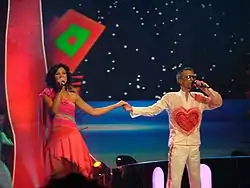 Linas and Simona in Istanbul (2004)
Linas and Simona in Istanbul (2004)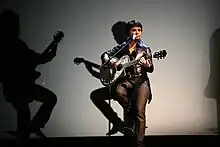
 Jeronimas Milius in Belgrade (2008)
Jeronimas Milius in Belgrade (2008)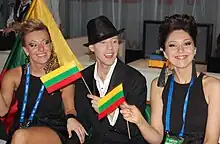
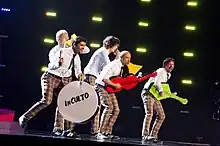
 Andrius Pojavis in Malmö (2013)
Andrius Pojavis in Malmö (2013)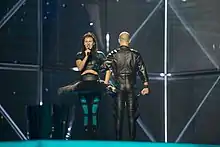

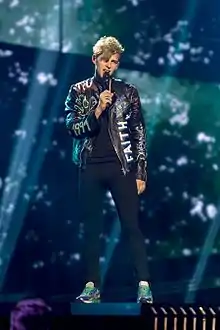 Donny Montell in Stockholm (2016)
Donny Montell in Stockholm (2016)
.jpg.webp) Ieva Zasimauskaitė in Lisbon (2018)
Ieva Zasimauskaitė in Lisbon (2018)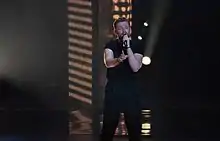 Jurij Veklenko in Tel Aviv (2019)
Jurij Veklenko in Tel Aviv (2019)
 Monika Liu in Turin (2022)
Monika Liu in Turin (2022).jpg.webp) Monika Linkytė in Liverpool (2023)
Monika Linkytė in Liverpool (2023)
See also
- Lithuania in the Eurovision Dance Contest – Dance version of the Eurovision Song Contest.
- Lithuania in the Junior Eurovision Song Contest – Junior version of the Eurovision Song Contest.
- Lithuania in the Eurovision Young Musicians – A competition organised by the EBU for musicians aged 18 years and younger.
Notes
- Specifically Samogitian, a dialect spoken mostly in Samogitia
- Contains words or phrases in French
- According to the then-Eurovision rules, the top ten non-Big Four countries from the previous year along with the Big Four automatically qualified for the Grand Final without having to compete in semi-finals. For example, if Germany and France placed inside the top ten, the 11th and 12th spots were advanced to next year's Grand Final along with all countries ranked in the top ten.
- Contains words or phrases in Lithuanian
- The 2020 contest was cancelled due to the COVID-19 pandemic.
References
- "Lithuanian Broadcaster Head supports his Estonian colleague in Eurovision boycott". ESCKaz. 2008-08-22. Archived from the original on 2012-03-20. Retrieved 2008-08-22.
- Vaida, Petras (2008-08-25). "Culture minister of Lithuania: too early to speak about boycott of Eurovision". The Baltic Course. Archived from the original on 2009-05-22. Retrieved 2008-08-25.
- Hondal, Victor (2009-12-15). "Lithuania seeking funding for Eurovision 2010". ESCToday. Archived from the original on 17 December 2009. Retrieved 15 December 2009.
- "Prasideda registracija į nacionalinę „Eurovizijos" atranką: šįkart galutinis sprendimas bus priimtas žiūrovų" [Registration for the national Eurovision selection begins: this time the final decision will be made by the audience] (in Lithuanian). LRT. 2023-10-18. Retrieved 2023-10-18.
- "Lithuania wins OGAE Fan Contest!". esc-plus.com. 16 May 2020. Retrieved 19 May 2020.
- Adams, William Lee (9 July 2015). "Poll: Who was the worst dressed Barbara Dex Award winner?". Wiwibloggs. Retrieved 8 December 2019.
- "Exclusive: These are the judges who will vote in Eurovision 2019". European Broadcasting Union. 30 April 2019. Retrieved 24 May 2019.
- "Events - Turin 2022 - Jury". European Broadcasting Union (EBU). Retrieved 27 June 2022.
- "Pirmojoje nacionalinėje "Eurovizijos" atrankoje dalyvavo ir šiandien pažįstami veidai". lrt.lt. May 18, 2019.
- "Lithuania – Dublin 1994". European Broadcasting Union. Archived from the original on 13 May 2018. Retrieved 8 November 2022.
- "TV – sobota, 30 kwietnia" (PDF). Kurier Wileński (in Polish). 30 April 1994. p. 11. Retrieved 28 October 2022 – via Polonijna Biblioteka Cyfrowa.
- "Pirmojoje nacionalinėje "Eurovizijos" atrankoje dalyvavo ir šiandien pažįstami veidai". lrt.lt. May 18, 2019.
- "TV – sobota, 18 maja" (PDF). Kurier Wileński (in Polish). 18 May 1996. p. 7. Retrieved 28 October 2022 – via Polonijna Biblioteka Cyfrowa.
- "Pirmojoje nacionalinėje "Eurovizijos" atrankoje dalyvavo ir šiandien pažįstami veidai". lrt.lt. May 18, 2019.
- ""Eurovizija 1998". Jungtinė Karalystė I dalis". 15 May 1998.
- "Lithuania – Jerusalem 1999". European Broadcasting Union. Archived from the original on 13 May 2018. Retrieved 26 June 2022.
- "TV – sobota, 9 maja" (PDF). Kurier Wileński (in Polish). 9 May 1998. p. 11. Retrieved 28 October 2022 – via Polonijna Biblioteka Cyfrowa.
- "Lithuania – Jerusalem 1999". European Broadcasting Union. Archived from the original on 13 May 2018. Retrieved 5 July 2022.
- "Kurier TV – sobota 29 maja" (PDF). Kurier Wileński (in Polish). 29 May 1999. p. 7. Retrieved 18 October 2022 – via Polonijna Biblioteka Cyfrowa.
- "Lithuania – Copenhagen 2001". European Broadcasting Union. Archived from the original on 13 May 2018. Retrieved 2 December 2022.
- "Lithuania – Copenhagen 2001". European Broadcasting Union. Archived from the original on 13 May 2018. Retrieved 5 December 2022.
- Meškinytė, Adelė. ""Eurovizijos" balsas D.Užkuraitis: smagi atsiradimo konkurse istorija ir atsakymas, ką išties mano apie šou". 15min (in Lithuanian). Archived from the original on 3 December 2022. Retrieved 3 December 2022.
- BNS. "Šeštadienį Kopenhagoje - "Eurovizijos" konkursas - DELFI Pramogos". Pramogos.delfi.lt. Retrieved 2012-08-09.
- "Lithuania – Tallinn 2002". European Broadcasting Union. Archived from the original on 13 May 2018. Retrieved 7 December 2022.
- Meškinytė, Adelė. ""Eurovizijos" balsas D.Užkuraitis: smagi atsiradimo konkurse istorija ir atsakymas, ką išties mano apie šou". 15min (in Lithuanian). Archived from the original on 3 December 2022. Retrieved 6 December 2022.
- Opheim, Bjørn Erik (22 February 2003). "50th Anniversary won't affect annual Eurovision". ESCToday.com. Archived from the original on 4 December 2013. Retrieved 23 November 2013.
- "Lithuania – Istanbul 2004". European Broadcasting Union. Archived from the original on 13 May 2018. Retrieved 9 December 2022.
- Meškinytė, Adelė. "'Eurovizijos' balsas D.Užkuraitis: smagi atsiradimo konkurse istorija ir atsakymas, ką išties mano apie šou". 15min (in Lithuanian). Archived from the original on 3 December 2022. Retrieved 6 December 2022.
- Bieliauskaitė, Lina (12 May 2004). "Linas ir Simona tikisi sėkmės" (in Lithuanian). Delfi. Archived from the original on 27 January 2023. Retrieved 27 January 2023.
- Osteikaitė, Reda (20 May 2006). "Lietuva susirungs Eurovizijos finalo scenoje" (in Lithuanian). Panevėžio balsas. Archived from the original on 30 January 2023. Retrieved 30 January 2023.
- Meškinytė, Adelė. "'Eurovizijos' balsas D.Užkuraitis: smagi atsiradimo konkurse istorija ir atsakymas, ką išties mano apie šou". 15min (in Lithuanian). Archived from the original on 3 December 2022. Retrieved 6 December 2022.
- Meškinytė, Adelė. "'Eurovizijos' balsas D.Užkuraitis: smagi atsiradimo konkurse istorija ir atsakymas, ką išties mano apie šou". 15min (in Lithuanian). Archived from the original on 3 December 2022. Retrieved 6 December 2022.
- "Lietuva – "Eurovizijos" finale! , DELFI Pramogos". Pramogos.delfi.lt. Retrieved 17 May 2011.
- Navickaitė, Viktorija (26 March 2013). ""Eurovizijos" vilkai apie menką Andriaus Pojavio savireklamą konkurse: rezultatams tai įtakos nedaro, bet rėmėjams – rūpi" [Eurovision wolves about poor Andriaus Pojavio selfpromo competition: the results is not affected, but the sponsors – care] (in Lithuanian). 15 min. Archived from the original on 28 May 2013. Retrieved 10 May 2013.
- "LRT žiūrovus visą savaitę džiugins "Eurovizijos" reginiai" [LRT will entertain the crowd throughout the week Eurovision spectaculars]. Lithuanian National Radio and Television (in Lithuanian). 6 May 2014. Archived from the original on 6 May 2014. Retrieved 6 May 2014.
- "Eurovizija 2014. 1-asis pusfinalis" [Eurovision Song Contest in 2014. 1st semifinal]. Lithuanian National Radio and Television (in Lithuanian). 6 May 2014. Archived from the original on 8 May 2014. Retrieved 7 May 2014.
- Pabiržis, Dovaidas (9 May 2016). ""Eurovizija": loterija be pralaimėjimo". veidas.lt (in Lithuanian). Veidas. Retrieved 10 May 2016.
- "D. Užkuraitis "Euroviziją" šiemet komentuos ne vienas - LRT". Lietuvos Radijas ir Televizija. 5 May 2017. Archived from the original on 5 August 2017. Retrieved 3 May 2018.
- "Eurovizinius Lietuvos balus šiemet skelbs E. Daugėlaitė". lrt.lt. 2 May 2017. Retrieved 2 May 2017.
- "Darius Užkuraitis ruošiasi "Eurovizijai": nuo pirmadienio ir jo laukia kelios repeticijos". lrt.lt (in Lithuanian). 2019-05-04. Retrieved 2020-04-05.
- Granger, Anthony (5 May 2019). "Lithuania: Darius Užkuraitis Enters Eurovision Commentary Booth For Twenty-Second Contest". Eurovoix. Archived from the original on 5 May 2019. Retrieved 5 May 2019.
- "Ilgai laukta 'The Roop' kelionė į Roterdamą ir pirmoji repeticija ant "Eurovizijos" scenos". lrt.lt (in Lithuanian). 5 May 2021. Retrieved 5 May 2021.
- "Lietuvos eurovizinius balus skelbs Andrius Mamontovas". lrt.lt (in Lithuanian). 18 May 2021. Retrieved 18 May 2021.
- „The Roop“ lyderiui Vaidotui teko ypatinga užduotis: „Eurovizijos“ finale skelbs lietuvių balus
- ""Eurovizijoje" Lietuvos balsus skelbs Monika Liu: tai buvo mano svajonė". LRT (in Lithuanian). 9 May 2023.